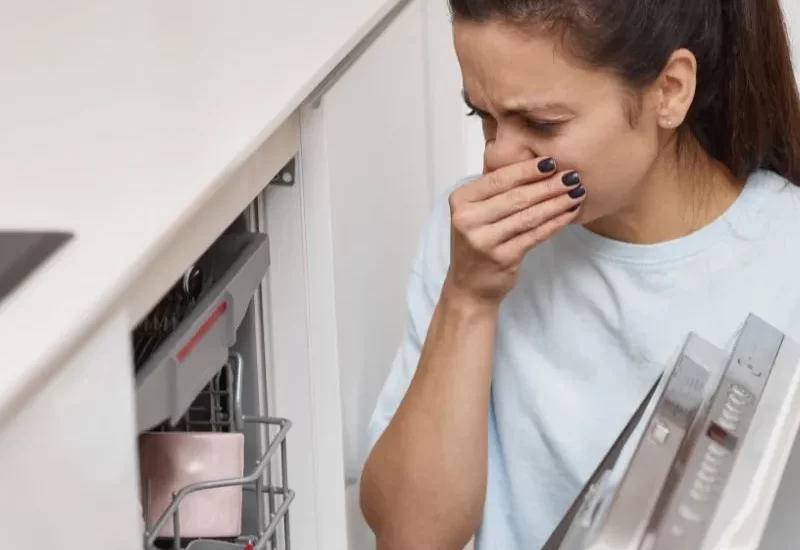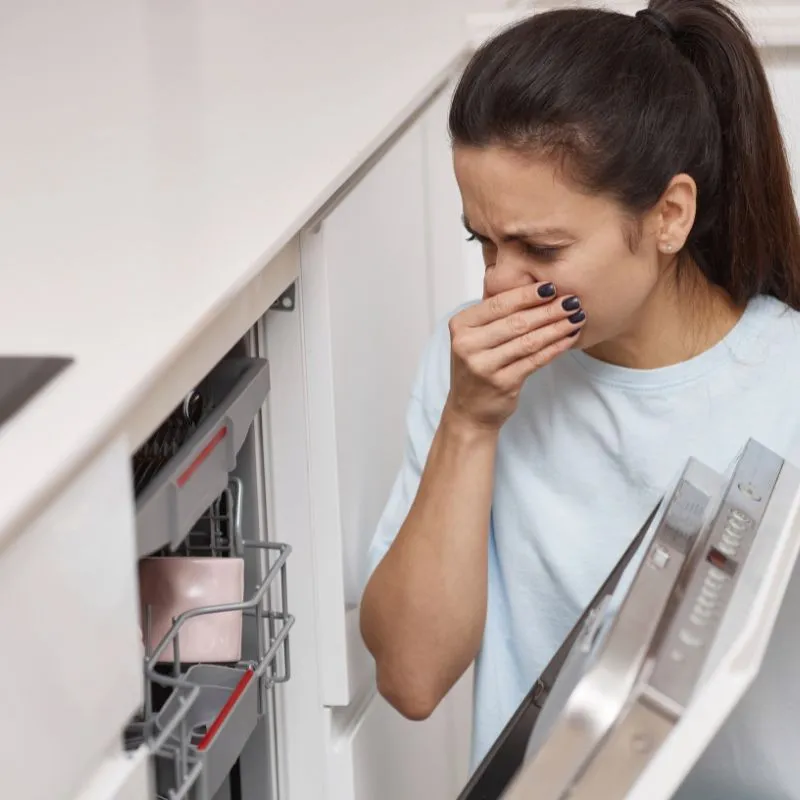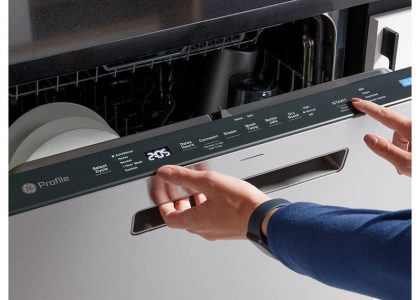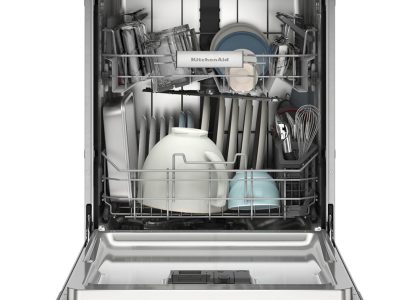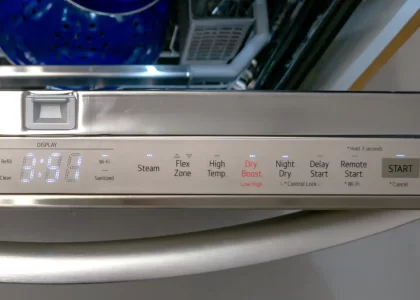Introduction to Dishwasher Odors
Many people ask, ‘why does my dishwasher smell bad?’ The reason is simple. Over time, food particles, grease, and soap scum build up in dishwashers. This creates a perfect environment for bacteria to grow. The odors you notice are often the result of this bacterial growth mixed with bits of food waste.
Being mindful of the issue isn’t enough; we need to understand what causes these smells. Recognizing the common reasons for these unpleasant odors is the first step towards solving the problem. The goal is not just to mask the smells, but to eliminate them at their source for a lasting solution.
Dishwasher smells can range from mild to severe. Smells may start off faint and become stronger over time. Regular maintenance can prevent most odors, but you must also respond promptly when you detect a bad smell. Neglecting to act can lead to more persistent and difficult-to-remove smells. In the following sections, we will delve deeper into identifying the sources of dishwasher odors and how to effectively get rid of them.
Identifying the Source of Dishwasher Smells
To tackle the ‘why does my dishwasher smell bad?’ question, we must identify the origin of the odor. First, check the dishwasher filter. This part often traps food residues. A clogged filter is a common source for bad smells. Next, inspect the spray arms. Small bits of food can get stuck in the holes, preventing water from flowing freely and causing odor buildup.
Another area to examine is the bottom of the dishwasher. This spot can collect food particles, leading to decay and unpleasant smells. Lastly, inspect the door gasket. Mold and mildew can develop in the folds of the gasket, producing a musty odor. By pinpointing the exact source of the smell, you’re better equipped to eliminate it effectively.
Remember, a clean dishwasher means a smell-free dishwasher. Each of these potential sources of dishwasher odors requires different cleaning methods. In the next section, we’ll outline a step-by-step cleaning process to help you eradicate these unpleasant scents from your dishwasher.
Step-by-Step Cleaning Process
Dealing with a smelly dishwasher can be frustrating, but with the right approach, you can effectively get rid of those unpleasant odors. This step-by-step cleaning process is designed to tackle smell at its root; it helps you clean your dishwasher thoroughly. Let’s get started.
- Empty the Dishwasher: Start with an empty dishwasher to ensure every nook and cranny is accessible for cleaning.
- Remove the Filter: Take out the filter, commonly found beneath the bottom spray arm. Rinse it under running water and scrub gently with a soft brush to remove trapped food particles.
- Clean Spray Arms: Check the spray arms for food debris caught in the holes. Use a toothpick to remove blockages to ensure water can flow freely.
- Wipe the Gasket: Mildew loves the door gasket. Use a cloth dampened with soapy water to clean the folds of the gasket.
- Inspect the Drain: Remove any visible food scraps from the dishwasher drain. This avoids clogs which contribute to bad smells.
- Run a Hot Water Cycle: Fill a dishwasher-safe container with white vinegar, place it on the top rack, and run a hot cycle. The vinegar helps to neutralize odors.
- Scrub the Interior: After the cycle finishes, sprinkle baking soda along the bottom of the dishwasher. Run a short cycle with hot water. Baking soda is an excellent odor-absorber.
- Leave the Door Ajar: After cleaning, leave the dishwasher door slightly open to help air circulate and prevent the buildup of mold and mildew.
By following these steps, you’re not just cleaning the dishwasher; you’re preventing future smells. Regular maintenance combined with this routine ensures the question, ‘why does my dishwasher smell bad?’ will be a thing of the past. In the following sections, we will share more tips and explore how ongoing maintenance can keep your dishwasher fresh and clean.
Tips for Keeping Your Dishwasher Smell-Free
Proper habits and routine care can keep ‘why does my dishwasher smell bad?’ worries at bay. Here are straightforward tips to maintain a fresh-smelling dishwasher:
- Regular Cleanings:
Conduct routine cleanings following the step-by-step process outlined above. This includes focusing on the filter, spray arms, and gasket.
- Use Rinse Aid:
Rinse aid can help keep your dishwasher interior dry and prevent odor-causing residue from sticking to surfaces.
- Hot Water Washes:
Occasionally run cycles with hot water without dishes. This can help dissolve and flush away any lingering odor sources.
- Proper Loading:
Ensure dishes are loaded correctly. This prevents blocking of spray arms and allows for more efficient cleaning.
- Regular Maintenance Schedule:
Record when you perform maintenance tasks and establish a regular schedule to make it routine.
- Fresh Lemon Peels:
After cleaning, place a few fresh lemon peels on the top rack during your next wash. It can leave your dishwasher smelling citrus-fresh.
Implementing these simple habits can ensure that your dishwasher remains free of bad odors and functions effectively. With regular attention, you can prevent the odors from developing in the first place, keeping your kitchen environment pleasant and inviting.
Common Dishwasher Odor Culprits and Solutions
Identifying what causes your dishwasher to smell bad is crucial in finding the right solution. Here are common odor culprits and how to fix them:
- Trapped Food Particles: These are often the main reason why dishwashers start to smell. Remove and rinse the filter regularly to prevent this issue.
- Grease and Oil Residues: Fatty substances can stick to dishwasher surfaces and go rancid. Run a hot water cycle with vinegar to dissolve and remove these residues.
- Mold and Mildew: These fungi thrive in damp environments. Clean the door gasket with a bleach solution, and keep the dishwasher door ajar after use.
- Stagnant Water: Water should not sit in the dishwasher after a cycle. Check the drain for clogs and remove any blockages.
- Decaying food in the Drain: Bits of food in the drain can decay and cause odors. Regularly check and clean the drain area.
- Unclean Filter: A dirty filter can harbor odors and bacteria. Clean it with soap and water every few weeks.
- Old Dishes Sitting Too Long: Don’t let dirty dishes sit in the dishwasher. Run a cycle soon after loading.
Finding the right solution for ‘why does my dishwasher smell bad?’ often involves a simple cleaning routine. By addressing these common odor sources, you can keep your dishwasher smelling fresh and clean.
The Role of Maintenance in Preventing Odors
Regular maintenance is key to preventing ‘why does my dishwasher smell bad?’ issues. Staying proactive with upkeep rituals can save you from foul smells later down the road. Here’s how to incorporate maintenance into your routine to fight off odors:
- Regular Filter Cleaning: Make it a habit to clean the filter every few weeks. A clean filter means fewer trapped food particles and less chance of smell.
- Monthly Deep Cleaning: Set a monthly reminder to deep clean your dishwasher. Use vinegar and baking soda as described in our step-by-step guide.
- Inspect for Clogs: Regularly look for clogs in the spray arms and drain. Remove any blockages to prevent stagnant water and odor buildup.
- Dry After Each Use: After every wash, leave the door open to let the interior dry completely. This helps to reduce damp conditions where odors breed.
- Check Seals and Gaskets: Inspect the seals around the door for wear and tear. Replace them if they’re allowing water to collect and mold to grow.
By regularly attending to these maintenance tasks, you’re attacking odor at its root. Don’t wait for a bad smell to begin your dishwasher’s care. Preventative measures are the most effective way to ensure you never have to ask, ‘why does my dishwasher smell bad?’ again.
Natural Remedies for Dishwasher Odors
In addition to regular cleanings, natural remedies can be quite effective against dishwasher odors. Such remedies are often safe, eco-friendly alternatives to chemical cleaners. Here are some you might try:
- Baking Soda: After your vinegar cycle, add a cup of baking soda at the bottom and run a short cycle. It absorbs odors well.
- White Vinegar: Place a bowl of white vinegar on the top rack and run a full cycle to neutralize smells. Do this monthly.
- Essential Oils: A few drops of lemon or lavender essential oil can leave a fresh scent. Add them to the rinse aid compartment.
- Lemon Peels: Place a handful of lemon peels on the top rack during a wash. They can work wonders in freshening up your dishwasher.
- Charcoal: A small, open container of activated charcoal can absorb odors between washes.
- Salt and Lemon Juice: Mix salt and lemon juice to create a paste. Use it to scrub the interior. Rinse thoroughly.
By using these natural remedies, you’re not only combating the ‘why does my dishwasher smell bad?’ issue, but also keeping your kitchen environment more natural and chemical-free. Remember to use these treatments regularly as part of your maintenance routine for the best results.
When to Call a Professional: Persistent Odor Problems
Sometimes, despite your best efforts, your dishwasher may continue to smell bad. This signals that it’s time to call in a professional. If you’ve worked through all the steps, used natural remedies, and maintained a strict cleaning schedule, yet the odor persists, professional help is needed. Here’s when you should consider this option:
- When you’ve cleaned every part but no improvement shows.
- If the odor gets worse or has a sewage-like smell that could point to bigger plumbing issues.
- After multiple deep cleanings and the smell won’t go away.
- If mold or mildew seems to have spread beyond reach, indicating a bigger problem.
- When the dishwasher shows signs of poor drainage or water pooling, suggesting potential clogs deep within the system.
Why does my dishwasher smell bad? A professional can diagnose the root of the problem, whether it’s a malfunctioning part, a need for deeper cleaning, or a plumbing issue. They have the tools and expertise to fix the issue and ensure that your dishwasher operates efficiently. Don’t wait until a minor smell issue turns into a major problem. Act promptly and get a certified technician to assess and resolve the situation. Keeping a routine check on common odor culprits and calling professionals when necessary will make the question, ‘why does my dishwasher smell bad?’ a rare concern.

